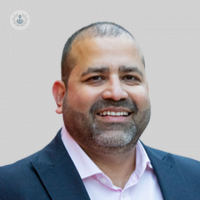Rain before the rainbow: the LGBTQ+ relationship with depression
Written in association with:Sexuality and gender exist on a spectrum that can be difficult to define, and this has resulted in historical persecution, fear, and misconception experienced by those who identify within the ever-evolving umbrella term of LGBTQ+. Due to this, many LGBTQ+ experience difficulties with mental health such as depression which is often mistaken as depression due to their sexuality or gender. An established expert in LGBTQ+ mental health and trauma-informed care, Dr Pavan Joshi breaks down the factors that can lead to depression in the LGBTQ+ community.

For a very long time and up until recently, to be LGBTQ+ was considered a mental illness. It was only in 1990 that the World Health Organisation (WHO) took homosexuality off the International Statistical Classification of Diseases (ICD) and two decades later in 2019, the WHO also took down their classification of transgender as a “mental disorder”.
At least 1.8 million people in the UK are LGBTQ+. Without a doubt, LGBTQ+ people are more visible than ever; many of us, if we are not LGBTQ+ ourselves, know and love LGBTQ+ celebrities, coworkers, friends, and family members. Although being LGBTQ+ may no longer be considered a crime or a mental disorder, according to Stonewall, a leading LGBTQ+ charity in the UK, members of this community are more likely to experience depression compared to their heterosexual and cis-gendered peers. Around half of LGBTQ+ people in the UK report that they have been or currently are depressed. Approximately one-eighth of LGBTQ+ youths have attempted suicide, and almost half of the transgender population have thought about ending their life.
What are the potential causes of depression in LGBTQ+ individuals?
With LGBTQ+ identities being pathologised until not so long ago, it is no wonder that LGBTQ+ people have had difficulties accessing mental health services, and may have negative experiences when trying to access care and services. Although it is illegal in the UK for healthcare providers to discriminate against patients based on their sexual or gender identity, many mainstream practitioners and services are still unequipped to address the specificities of the mental health issues that cause them distress, such as:
- Discrimination and stigma:
- Despite homosexuality and being transgender being declassified as mental health disorders and decriminalised, LGBTQ+ people are still at risk from homophobia and transphobia in social environments such as their workplaces and in public access spaces like the train or dining establishments. Their self-worth is impacted and causes the individual to isolate themselves for fear of verbal abuse or a physical attack. Some individuals who are LGBTQ+ may never “come out” to avoid such stigma. This further exacerbates any shame towards themselves, their sexuality, or their bodies.
- Familial rejection:
- LGBTQ+ individuals may face rejection from their parents, siblings, children, and extended family members, and may even be at risk of domestic violence or attempts at conversion. The loss of a core safe space like the home is very traumatic and is debilitating to one’s mental health.
- Minority stress and social isolation:
- Being part of a small, marginalised group leads to a constant feeling of being in “enemy territory”; an LGBTQ+ individual who hasn’t found safe spaces, other LGBTQ+ people, or friendly allies will mean that the individual will never be certain when they can truly express themselves without prejudice, beginning to feel the strain of keeping up appearances. This will lead to feelings of hopelessness and isolation, especially for those living in smaller, less-accepting communities.
- Lack of support:
- There are not a lot of resources that affirm and support those of LGBTQ+ identities or facing issues unique to their gender and sexuality. This limitation prevents LGBTQ+ people from accessing proper healthcare or adopting appropriate coping strategies, which can have dire consequences later in their lives.
How can LGBTQ+ people with depression get professional support?
Slowly but surely, more and more medical institutions are considering the complexities of LGBTQ+ identities, putting in the effort to communicate and understand their patients. Some psychologists and psychiatrists have dedicated themselves to the treatment and research of LGBTQ+ mental health needs, such as the Royal College of Psychiatrists’ Rainbow Specialist Interest Group (SIG). Of course, there are also mental health practitioners who are LGBTQ+ themselves, allowing them further insight and empathy into their patients’ needs. Being seen, heard, and acknowledged by a professional in mental health helps an LGBTQ+ person feel validated in their feelings, navigate their trauma, and apply them with coping tools so that they can fortify their confidence and feel capable of engaging proudly with the world.
If you or a loved one are LGBTQ+ and struggling with mental health issues, Dr Pavan Joshi is well-equipped to assist and can be booked for appointments via his Top Doctors profile.


